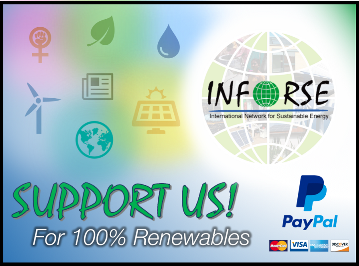|
|
|
|
|
|
|
|
|
|
|
|
|
|
|
|
|
|
|
|
|
| Follow Us: |
| A Key to Local Income (Editorial) | |
| By Gunnar Boye Olesen, Michael Kvetny, Editors | |
|
Renewable-energy technologies can provide a more stable and a more affordable energy supply to communities that are outside the reach of reliable energy supply systems. This is particularly needed in many of the rural areas in developing countries. For these parts of the world, available energy can be the key to the success of several income-generating activities. Sustainable energy services means making enhanced use of locally available renewable energy sources and of locally produced technologies. This generates local income, often in the form of local jobs. It also reduces the demand for energy imports and increases the security of the energy supply. We have dedicated a large part of this issue to examples in which sustainable energy creates income and jobs. Several of the examples show ways to provide energy for rural activities in developing countries. Obviously, some types of renewable-energy technologies are better suited than others to support various activities. Where available, micro-hydro power is a good source of electricity for activities with concentrated energy demands. Similarly, solar energy is often favourable for drying/heating purposes. One conclusion from these and other examples is that it is important not to limit the promotion of renewable energy to a single solution, e.g., to electricity-producing solar cells. The importance of sustainable energy to development is increasingly understood in official channels. The G8 countries stated at their recent meeting in Japan that they are committed to “encourage and facilitate investment in the development and use of sustainable energy. To this end, the increased use of renewable energy sources in particular will improve the quality of life, especially in developing countries.” The new World Bank loan for renewable energy in India (see p. 12) points in the same direction. The task now is to advance from the nice words and scattered initiatives to a general priority for sustainable energy in national governments, in development banks, and in international organisations. Maybe next year’s meeting of the Commission for Sustainable Development can be a step in that direction, if it is not captured by lobbyists for nuclear power and for other centralised technologies (see back page). |
|

| |
| Published in Sustainable Energy News |
|
|
Go back to main page of ISSUE #30 (683KB) 18 pages (2000-08-11) |
|
| Contact | |
| |
INFORSE Secretariat Klosterport 4F, 1. floor DK-8000 Aarhus C Denmark Phone: +45 86 22 70 00 Twitter: INFORSE_org Facebook: INFORSE Web: inforse.org E-mail: ove@inforse.org |
